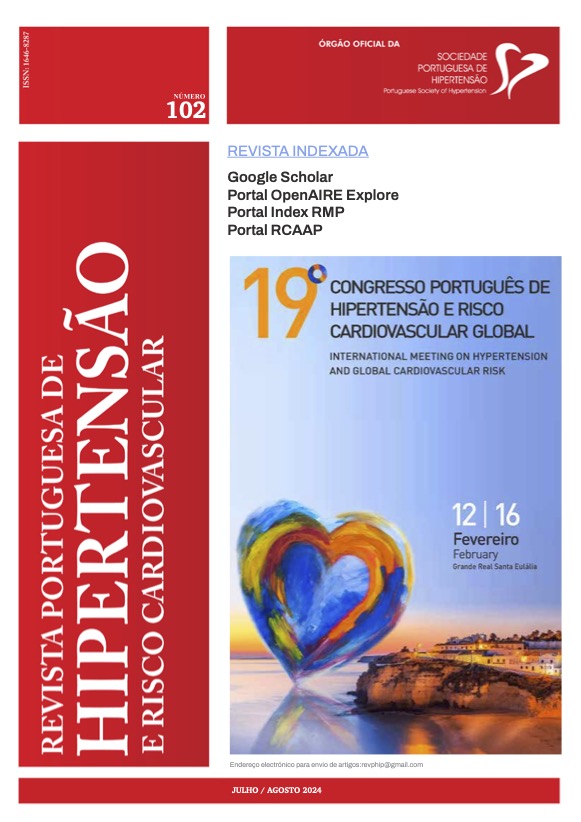Longitudinal Study Of The Lipid Panel Of Hospital Healthcare Workers In A 10-Year Period
DOI:
https://doi.org/10.58043/rphrc.93Keywords:
Occupational Medicine, dyslipidemia, cholesterolAbstract
Introduction: Dyslipidemia is an important risk factor to the development of cardiovascular diseases, the main mortality cause in Portugal. Evaluation and intervention in blood cholesterol levels (such as total cholesterol, LDL - Low Density Lipoprotein and HDL - High Density Lipoprotein) is an effective primary prevention strategy.Objectives: This study aims to evaluate the lipid panel of healthcare workers from a Hospital Centre in the interval between 2011 till 2021.
Methods: Retrospective longitudinal observational study evaluating the total cholesterol, LDL and HDL levels from the Hospital Centre’s workers in 2011 and in 2021. Data was collected from the Occupational Medicine health consultations and the blood tests performed by the healthcare workers in the studied Hospital Centre. The aim is to evaluate the relation between the Department, educational background, professional group, tobacco use, gender and age of the workers and their lipid panel.
Results: There were selected 732 workers to this study. It was observed that LDL and HDL increased from 2011 to 2021. LDL (2011) was higher in male workers and HDL (2011 and 2021) was higher in female workers. Total cholesterol and LDL (2011 and 2021) was lower in [20;29] years that [40;49] and [50;59] years old. Total cholesterol and LDL (2021) of workers with 7th-9th grade are higher than workers with Master’s degree. HDL (2021) of workers in the Medical department was higher than in the Administrative department.
Discussion/Conclusions: In this sample there were observed already known associations and there were hypothesised other correlations which can lead to more studies in similar populations.
Downloads
References
(1) Óbitos por algumas causas de morte (%) – Pordata, última atualização: 2023-05-17, disponível em https://www.pordata.pt/portugal/obitos+por+algumas+causas+de+morte+(percentagem)-758 (último acesso: 2023-06-30)
(2) SCORE2 working group and ESC Cardiovascular risk collaboration. SCORE2 risk prediction algorithms: new models to estimate 10-year risk of cardiovascular disease in Europe. Eur Heart J. 2021 Jul 1;42(25):2439-2454. doi: 10.1093/eurheartj/ehab309. PMID: 34120177; PMCID: PMC8248998.
(3) Rao Ch S, Subash Y E. The effect of chronic tobacco smoking and chewing on the lipid profile. J Clin Diagn Res. 2013 Jan;7(1):31-4. doi: 10.7860/JCDR/2012/5086.2663. Epub 2013 Jan 1. PMID: 23449989; PMCID: PMC3576744.
(4) Schaefer EJ, Lamon-Fava S, Cohn SD, Schaefer MM, Ordovas JM, Castelli WP, Wilson PW. Effects of age, gender, and menopausal status on plasma low density lipoprotein cholesterol and apolipoprotein B levels in the Framingham Offspring Study. J Lipid Res. 1994 May;35(5):779-92. PMID: 8071601.
(5) Pascot A, Lemieux I, Bergeron J, Tremblay A, Nadeau A, Prud'homme D, Couillard C, Lamarche B, Després JP. HDL particle size: a marker of the gender difference in the metabolic risk profile. Atherosclerosis. 2002 Feb;160(2):399-406. doi: 10.1016/s0021-9150(01)00579-2. PMID: 11849664.
Downloads
Published
How to Cite
Issue
Section
License
Copyright (c) 2024 Miguel Pereira, Diogo Abreu, Helena Alves, Laura Silva, Salomé Camarinha, Inês Milhazes, Ana Paula Sardo, Daniel Melo, Fernando Mautempo

This work is licensed under a Creative Commons Attribution 4.0 International License.




